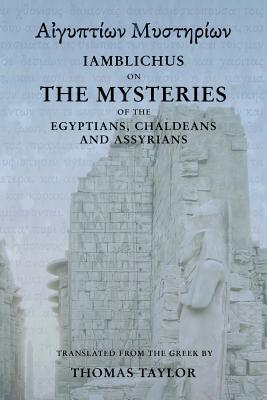Iamblichus on the Mysteries of the Egyptians, Chaldeans, and Assyrians

Iamblichus on the Mysteries of the Egyptians, Chaldeans, and Assyrians
The present volume is a verbatim reproduction of Thomas Taylor's translation of Iamblichus's Egyptian Mysteries, originally published in 1821. The work is divided into two main parts: the "Epistle of Porphyry to Anebo" and the reply given him by the preceptor Abammon-the name assumed by Iamblichus, who was the real author of the reply. The latter is itself divided into ten sections, each treating of a series of related subjects raised by the questions posed in the epistle. Taylor provides an introduction and appends a collection of "additional notes" to the original text, both of which supply great insight into the nature and meaning of the mysteries discussed by Abammon. In the present edition, the formatting of the original has been changed in order to render the text more easily readable. The copious footnotes found in the original have been collected and placed in order at the end of the reply of Abammon, allowing for a more easily readable layout. In the margins we have added the pagination of the original edition, so that all references made to the original over the intervening centuries may be easily traced in the present volume, despite its altered pagination. Besides these changes, and minor changes in formatting style, the text has not been altered, except in cases where certain Greek characters were in need of modernization. "It appears to me that there are two descriptions of persons by whom the present work must be considered to be of inestimable worth, the lovers of antiquity and the lovers of ancient philosophy and religion. To the former of these it must be invaluable, because it is replete with information derived from the wise men of the Chaldeans, the prophets of the Egyptians, the dogmas of the Assyrians, and the ancient pillars of Hermes; and to the latter, because of the doctrines contained in it, some of which originated from the Hermaic pillars, were known by Pythagoras and Plato, and were the sources of their philosophy; and others are profoundly theological, and unfold the mysteries of ancient religion with an admirable conciseness of diction, and an inimitable vigour and elegance of conception."-Thomas Taylor, from the Introduction "The following testimony of an anonymous Greek writer, prefixed to the manuscript of this treatise proves that this work was written by Iamblichus: "It is requisite to know that the philosopher Proclus, in his Commentary on the Enneads of the great Plotinus, says that it is the divine Iamblichus wh
PRP: 139.42 Lei
Acesta este Prețul Recomandat de Producător. Prețul de vânzare al produsului este afișat mai jos.
125.48Lei
125.48Lei
139.42 LeiLivrare in 2-4 saptamani
Descrierea produsului
The present volume is a verbatim reproduction of Thomas Taylor's translation of Iamblichus's Egyptian Mysteries, originally published in 1821. The work is divided into two main parts: the "Epistle of Porphyry to Anebo" and the reply given him by the preceptor Abammon-the name assumed by Iamblichus, who was the real author of the reply. The latter is itself divided into ten sections, each treating of a series of related subjects raised by the questions posed in the epistle. Taylor provides an introduction and appends a collection of "additional notes" to the original text, both of which supply great insight into the nature and meaning of the mysteries discussed by Abammon. In the present edition, the formatting of the original has been changed in order to render the text more easily readable. The copious footnotes found in the original have been collected and placed in order at the end of the reply of Abammon, allowing for a more easily readable layout. In the margins we have added the pagination of the original edition, so that all references made to the original over the intervening centuries may be easily traced in the present volume, despite its altered pagination. Besides these changes, and minor changes in formatting style, the text has not been altered, except in cases where certain Greek characters were in need of modernization. "It appears to me that there are two descriptions of persons by whom the present work must be considered to be of inestimable worth, the lovers of antiquity and the lovers of ancient philosophy and religion. To the former of these it must be invaluable, because it is replete with information derived from the wise men of the Chaldeans, the prophets of the Egyptians, the dogmas of the Assyrians, and the ancient pillars of Hermes; and to the latter, because of the doctrines contained in it, some of which originated from the Hermaic pillars, were known by Pythagoras and Plato, and were the sources of their philosophy; and others are profoundly theological, and unfold the mysteries of ancient religion with an admirable conciseness of diction, and an inimitable vigour and elegance of conception."-Thomas Taylor, from the Introduction "The following testimony of an anonymous Greek writer, prefixed to the manuscript of this treatise proves that this work was written by Iamblichus: "It is requisite to know that the philosopher Proclus, in his Commentary on the Enneads of the great Plotinus, says that it is the divine Iamblichus wh
Detaliile produsului











